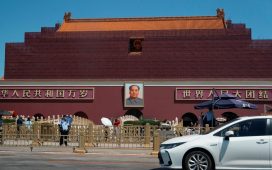Mumbai: On the night of November 26, 2008, when 10 Pakistani gunmen carried out mayhem in the city, the Mumbai police were caught unaware. Army-like trained terrorists went on to take civilians hostage, killed as many as 166 people and injured several others by firing upon them at Colaba, CST Railway Station and Cama Hospital among other South-Mumbai locations. Mumbai Police looked helpless and clueless as to how to respond to a war-like situation. Fifteen years down the line, the Mumbai Police has improved their combat skills, weaponry, and surveillance mechanism to tackle such situations. The police department now has QRT, Force One, CCTV cover across the city and an upgraded Marine Police Unit.
Quick Response Team
Mumbai city has been vulnerable to attacks from terrorists and underworld elements. There was a need for a highly trained, motivated, young, fit and fully equipped team to tackle such groups and to terminate hostage situations. In the wake of the 26/11 attack, the QRT was raised on the lines of NSG and Force One in August 2009 to act as first responder to terror attacks and other major security threats. This team responds in the shortest time, moves by fastest means, takes action to collect tactical information and neutralizes the threat. They rescue hostages, render assistance to Central forces and other State forces on Government duty. The QRT is divided into six units, Main QRT is stationed at Kalina and five QRT units, at each regional control room in the city wise South, Central, West, East and North. Main QRT works under the supervision of Addl. Commissioner of Police (Protection & Security). Regional QRT works under the supervision of Regional Addl. Commissioner of Police. Similarly an elite commando unit Force One was set up at the state level on the lines of National Security Guards.
CCTV surveillance
After the dreaded 26/11 attacks and the terrorist attacks that followed later in Mumbai, the Maharashtra government felt the need of setting up CCTV cameras at important junctions and strategic locations in Mumbai. The government then came up with a decision to set up 6000 CCTV cameras across the city so that the city is under round-the-clock surveillance. Major cities in Western and European countries are under CCTV surveillance which helps law enforcing agencies to keep an eye on suspicious elements on the streets. The CCTVs are monitored by the video walls at the police control rooms. A batch of policemen man the video walls in shifts. The said cameras are used for multipurpose, such as keeping vigil on traffic jams and street crimes.
Mobile vehicle scanner, armoured vehicles, Speed boats, sea-legs & hi-tech weapons
The Mumbai Police had purchased Rs 7 crore worth Mobile Vehicle Scanner to detect explosives. The police also bought bulletproof armoured vehicles that would have at least five to six fully trained policemen with sophisticated weapons and would act as first responders in case of any terror attack. The police had also bought speed boats and sea-legs amphibian vehicles to strengthen its Marine wing. The Mumbai police had introduced their dedicated marine wing, which would coordinate with the Indian Coast Guard and Indian Navy to secure the Indian waters. The police, Navy and Coast Guard also introduced the Sagar Kavach initiative to check preparedness and awareness at the sea. The city police had also purchased hi-tech machinery and is now equipped with advanced weapons like anti-material gun, snipers and MP5 guns among others.
High-security cells for high-profile jail inmates
Mohammad Ajmal Amir Kasab, the lone terrorist who was caught alive in the 26/11 Mumbai terror attack, was lodged in a high security Anda Cell in Arthur Road jail. In 2019, the state government had floated a tender for construction of the high security cell inside Arthur Road jail to lodge high-risk inmates like Nirav Modi, Mehul Choksi and Vijay Mallya. This eventually means that the capacity to keep most wanted criminals in Arthur Road jail will increase. There is a high level of security provided at the entrance to barrack barrack no 12 and further with several CCTV cameras which are monitored 24/7 from the control room. A prison officer and a prison guard are on duty at this barrack on a 24/7 basis for further security related assistance of inmates. In the barrack no 12, inmates can exercise and socialise only in area provided within the barrack and are not exposed to any issues of the larger Arthur Road jail complex outside of the barrack. Capacity of barrack No 12, which has two rooms. Three people can be lodged in each room.”
Published on: Friday, November 24, 2023, 06:00 AM IST










